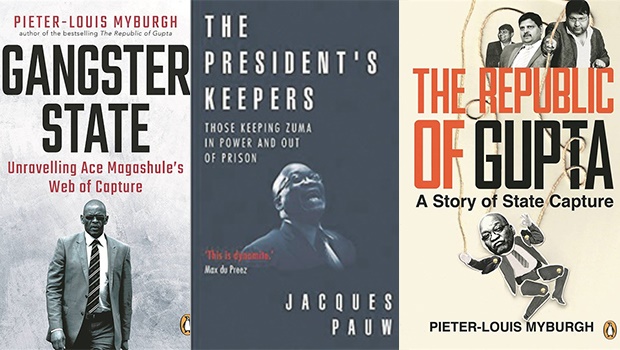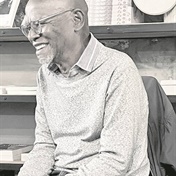
There is a trope that runs through Gangster State, published by Penguin Random House this year; The Republic of Gupta, published by Penguin Random House in 2017; and The President’s Keepers, published by Tafelberg in 2017. And that trope is the repurposing of the state for the benefit of predatory political elites.
Surely what transpired and perhaps continues to transpire in the Free State is happening and has been happening in the other provincial governments?
So, while Treasury dispenses its annual allocations to various provinces to disperse to various municipalities for the benefit of the people, the political elites have simply hijacked this sphere for their nefarious ends.
And, to all intents and purposes, the so-called radical economic transformation mantra has become a guise to hide primitive accumulation.
It is a race to the bottom
Pliable previously disadvantaged contractors are awarded contracts that in any normal bidding process they are unlikely to win. Contractors that are not even up to the task are awarded contracts simply as a conduit for political elites to pilfer the national fiscus.
To further illustrate this point, some of these contractors are registered just a few months, if not weeks, before the tenders are advertised. It is easy to discern that the said companies are conceptualised to fit a certain purpose.
The contractors are simply funnels that channel financial resources from the state to the political elites who take their cut at the other side of the auto-teller machine.
The contractors simply sign a contract with the devil, as it were; they are told they will get the job provided the political elites are guaranteed their cut once the payments are effected.
So, the system is not necessarily about the delivery of services to the poor but simply a get-rich-quick scheme for both the political elites and the contractors.
The Free State province’s department of human settlement’s R2 billion housing project is a classic case of this primitive accumulation by the political elites and their concomitant travellers in the form of private contractors.
That the project was named “housing” was simply an attempt to give it a semblance of respectability, while the whole exercise is about extracting as much maximum value for the tenderpreneurs.
The process is solely focused on the payment of contractors and very little on the delivery of the said houses.
Furthermore, the situation is made worse by the conflation of party and state.
President Kgalema Motlanthe made a good point recently, saying that the challenge we have in South Africa is that the ANC has simply failed to build a “state”. It has failed to appreciate that governments come and go, but the state is permanent and you therefore need a professional civil service that serves under whatever government is in power.
Embedded in Gangster State is this motif of the conflation of the state and the incumbent political party.
So, resources meant for the poor are simply redirected for party-political purposes to prolong the continuous pilfering of the fiscus.
Moreover, it would seem that provincial governments have now learnt the art of circumventing national legislation as far as the observing of procurement legislation is concerned.
The case of the Free State’s human settlement department simply transferring the asbestos audit contract from the Gauteng provincial government’s human settlement department is an apt case in point.
In order not to advertise the contract, the Free State’s department of human settlement simply transfers this contract and awards it to a set of predetermined contractors who are, in practical terms, already briefed on how the largesse is to be distributed, hence the existence of a spreadsheet drawn beforehand, which clearly stipulates who is to receive what.
This is exactly why the contractors were then paid R51 million without submitting an invoice.
And on December 22 nogal. Who goes to work in the public sector during the festive season? Here they did because they had to “eat”.
The invoice was later sent from the Cayman Islands, long after the largesse was already distributed and spent.
There is also the issue of tax avoidance and generally evading law enforcement agencies and the financial services nodes through the withdrawal of large amounts of money topay “the fixers”.
The transactions are not done through the electronic banking system to evade the prying eyes of the financial intelligence centre.
So, in South Africa we now have an illicit economy of “hard currency” wherein many contractors and the political elites wander about with large swaths of money.
It is a money bag and boot of a car economy.
This will explain how Ignatius “Igo” Mpambani, when murdered, was found with almost a million rands in hard currency stashed in his car.
It is like an Italian movie script.
This will explain the growing phenomenon wherein many of our political elites are buying real estate and expensive vehicles with “hard currency”, effectively bypassing the financial services sector.
We have a parallel economy that is bankrolled by the national fiscus for the benefit of connected contractors and political elites and it is effectively conducted through the exchange of hard currency.
An educated fool
It would seem that “public servants” have abrogated their responsibilities for the public good, in service of themselves, their families and cronies. The state has simply become a means to a very lucrative financial end.
This would explain why someone, such as Mpambani, who studied in prestigious US universities and had an illustrious job with an investment bank in Sandton, would ditch it for the more lucrative space of serving the political elites while amassing humongous wealth in a very short space of time.
However, at what price? The narrative simply illustrates an “educated fool” simply running around between Johannesburg and Bloemfontein doing the bidding of his handlers.
Very sad indeed
So, what is to be done to arrest this phenomenon?
The procurement environment will need to be further strengthened somehow, and maybe even taken away from the provincial political barons and centralised. That will take away their power to dispense patronage. Once South Africa can resolve its procurement conundrum, it will be able to take the wheat from the chaff.
Something akin to the chief procurement officer
Furthermore, we discern a phenomenon wherein there is an inordinate preoccupation with “the procurement process” to the detriment of “governance” from those at the upper echelons of power.
As The President’s Keepers clearly illustrated, Jacob Zuma’s lackadaisical attitude towards matters of governance in favour of procurement processes at Eskom, the SABC, Transnet, SAA etc, Gangster State aptly captures how Ace Magashule was, effectively, a “procurement premier”.
Surely for him to have had his taps on all or most provincial tenders meant very little was done in terms of governance matters? And the results are there for all the people of the Free State and South Africa to see.
Essentially, now, there is a pervasive sense that the “government” has become the “criminal”.
Most of the shenanigans that are explored in Gangster State, The Republic of Gupta and The President’s Keepers is that they can be classified as matters of state, though they are committed in the guise of national duty, they are stuff we used to watch only in the movies. If Gangster State could be read as an allegory of the shenanigans pertaining to provincial governments, the future is too ghastly to contemplate.
Ngobeni is an academic publisher and the SA finalist for the 2007 International Young Publisher of the Year award




 Publications
Publications
 Partners
Partners








